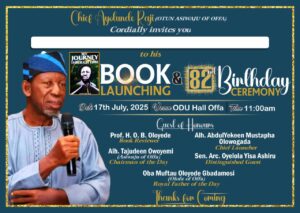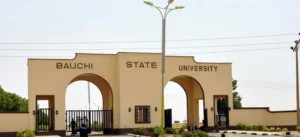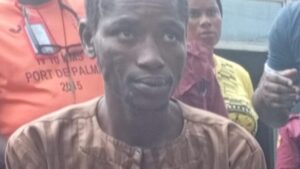Ajibogun Ancestry – not Ọwá Ajíbógun of Ìjẹ̀ṣà – is known as sculptors and crafters. They forged pestle and mortals, arrows, images of deities from woods.
There once lived a man called Ọlágbáyi in the ancient Ọjọwọn. He had three sons: Ose, Okóyè and Ajibogun. Both Okóyè and Ajibogun become sculptors, Ose followed the Tapa in mosquerade mysteries (Read the ancestries of Ogbin and Ọyọ).
How they come to adopt the nameAjibogun is unknown, but could be attributed to eventual popularity of his works.
Ògodo, a character played by Ibrahim Chatta in the movie OlógunẸru (written, produced and directed by TaofikAbisogunDìgbòluja) tells a story about this ancestry, fictious it may be.
Akàno, ọmọbàaṣeàádáTọrọni 1
(Akàno, no food for lazy men)
Òsémẹgunooo
Meelẹgunọtínílé,
(I didn’t have stale alcohol at home)
Ọmọọtígbé’léàhùnọtíkàn 2
(Alcohol become stale in a stingy man’s house)
Ọlọ́jẹ, ọmọàláìrókògbẹigiọpẹ
(Ọlọ́jẹ, those who cut mahogany trees to the size of palm trees)
ẸruníléỌlọ́jẹ,
(A slave of Ọlọ́jẹ)
ÒunpéọmọỌlọ́jẹlòun
(Claimed to legitimacy)
IwọfaníléỌlọ́jẹ
(A serf of Ọlọ́jẹ)
ÒunpéọmọỌlọ́jẹlòun
(Claimed legitimacy)
ỌmọbíbíinúỌlọ́jẹ
(Ọlọ́jẹ own child)
ÒunnáàpéọmọỌlọ́jẹlòun
(Also claimed legitimacy)
Wọn k’ ẹjọ́ ó di iléọba
(They reported themselves to the king)
Ọbaní, “ìwọẹrúníléỌlọ́jẹt’òunpéọmọỌlọ́jẹniìwọ
(The king said, “you slave of Ọlọ́jẹ who claims legitimacy)
Walọinúigbókoolọrèégbẹ́nàwá”
(Go into the forest and make some sculptural works”)
O dénuigbó,
(He went to the forest)
Ó gbẹ’gi, igi ó lápá, igi ó lórí, igi ó lẹsẹ 3
(He cut a tree; but the works’ parts were indistinguishable)
Ọbaní, “ẹ gbéiyunnisọnù”
(The king said, “throw that work away”)
Ajíbógunni, “ẹ máṣegbéiyunnisọnù, ẹ gbépamọ”
(Ajíbógun said, “do not throw it away, rather keep it”)
Ọbaní, “ìwọIwọfaníléỌlọ́jẹt’òunpéọmọỌlọ́jẹniìwọ
(The king said, “you serf of Ọlọ́jẹ who claims legitimacy)
Walọinúigbókoolọrèégbẹ́nàwá”
(Go into the forest and make some sculptural works”)
O dénuigbó,
(He went to the forest)
Ó gbẹ’gi, igi ó lápá, igi ó lórí, igi ó lẹsẹ
(He cut a tree; but the works’ parts were indistinguishable)
Ọbaní, “ẹ gbéiyunnisọnù”
(The king said, “throw that work away”)
Ajíbógunni, “ẹ máṣegbéiyunnisọnù, ẹ gbépamọ”
(Ajíbógun said, “do not throw it away, rather keep it”)
Ọbaní, “ÌwọọmọbibiinúỌlọ́jẹ
(The king said, “oh you Ọlọ́jẹ’s own child)
WalọinúigbókoolọrèéṣebíAjíbógunbàbàyíntí ń ṣe
(Go into the forest and make some sculptural works like your forefathers”)
O dénuigbó,
(He went into the forest)
Ó gbẹ’gi, igirírékété,
(He cut a tree; the work was a masterpiece)
Ó bùpèlés’igilápáọtun,
(He scarified Pèlé on the right cheek)
Ó bùÀbájás’igilápáòsì 4
(And Àbájá on the left cheek)
Ọbaní, “dájúdájú, ìwọniọmọỌlọ́jẹ,
(The king said, “verily, you are a legitimate child of Ọlọ́jẹ)
Ọmọàláìrókògbéigiọpẹ
(Those who split mahogany trees)
It would be recalled that Lágbáyi had made his marks in sculpture during the time of AláàfinAbiọdunAdegorolu. (Check the history of Òpómúlérò)
No gbọ́dọ̀ gbẹna tan
(I must yet be done with sculpture)
Ẹniagbẹ́na a r’ỌyọláyéAbiọdun
(He who was a sculpturor would go to Ọyọ when King Abiọdun reigned)
Ọlọ́jọwọnwọn a gbẹnatíwọnlogiidọbọ̀ nikiribiti
(Ọlọ́jọwọn was a fine sculpturor of woods)
Ó toríbàbàèmiLágbáyi, araỌjọ́wọ̀n
(When it come to my father Lágbáyi of Ọjọ́wọ̀n)
Bàbá mi ń gbẹnar’ỌyọláyéAbiọdun
(He took sculpture to Ọyọ)
Ọgọ́jọòpóniBàbáAjíbógungbẹ
(He did sculpture works with 160 trees)
Ó níwọn ò ṣeọgọrinrẹl’ayaba
(He made 80 in image of king’s mother)
Àádọ́rinrẹòsìẹfa
(70 in some other image)
Ẹẹwayòókù lo ni ó máagbalẹsẹ Sango lọrọrùn
(And the last ten, he carved at Sango’s shrine)
Òpó ó fọhunríláyéỌbaAbiọdun
(Polls never talked while Abiọdun was alive)
Níjọòpó ó fọhun, ojú mi lóse
(I was a witness the day it did)
Ẹlẹ́ru ń jogúnẹrú
(While some were inheriting slaves)
Oniwọfa n jogúnIwọfa
Aláṣọ n jogúnaṣọ
(Some inherited clothes)
Òpówáro’ṣọ, ÒpókànduduníwájúỌba
(Polls – with all their wooden customes)
Ó kàwọlèrí, ó ń sunkún
(Lamented and cried)
Ó lòun ó rẹnitíyiojogúnìranbàbàòun
(It said there was nobody to inherit it)
ÁbínbésulọjogúnìranÒpó….
(It’s Ábínbésu that inherited the Polls)
ORÍKÌ AJÍBÓGUN
‘Lágbáyi, ọmọabo’rókòlowolọ́wọ́
(‘Lágbáyi, those who made money from cutting mahogany trees)
ỌmọẸlẹ́jọÀwùju 5
L’Osemose’dò ń ó páẹja 6
(I lived with Ose, I didn’t kill fish)
L’Osemose’do ń ó pákorò
(I lived with Ose, I didn’t hunt any aquatics)
Ose ń wọnṣeéodòiwájúọmọKújẹnra 7
(Ose had all fore waterways locked; in front of Kújẹnra’s descendants)
L’Oselaa se gbogboodòlẹhin 8
(Ose had all latter waterways locked)
OseLágbáyimo se gbogboodòláàárín,
(Ose had all mid-waterways locked)
Bàbáwá ń rodolágbádagbùdùomi
(Our fathers detested streams)
Ọmọarúgbókan se ọbẹ se ọbẹl’ÒjèIlé,
(One elderly person cooked soup in ÒjèIlé)
OjúÉérulókusì 9
(And expired at the kitchen)
Bí ó bákú, n ó f’ọbẹnajẹ
(Had he not expired, I would eat in the soup)
Ọkùnrintààràkànlẹń’Ìsàlẹ̀ Ọwọn
(One tall, handsome man who lived in Ọwọn)
Ọmọwíwọ̀nẹ̀dùnl’ÒjèIlé 10
(Descendants of swift cutlass)
Ọmọònípọn-rán-gan-dán
Ọmọònípọn-ràn-gan-dàn 11
Òunláà fi dáigilẹkúnèso
(That’s used to abruptly stopped trees from having more fruits)
Ọmọọwọẹ̀dùn
(Descendants of swift cutlass)
Ọmọònípọnrángandán
Òunláà fi sọs’Árábàni’gọkalẹ 12
(That’s used to demolish Árábà trees)
Ọmọ a-wo-(igi)-Árábà-yán-yán-bi-ko-di-(Igi)-Ìrókò
(Those who demolished Árábà trees as well as Ìrókò)
NíléKújẹnra, aráÀgbòṣókùn
(In the home of Kújẹnra of Àgbòṣókùn)
AréèỌjẹ, aráỌjọwọn
ỌmọÓse ń gbẹ́nàIju
(Ose was making sculptural works in the forests)
Okóyè ń kóeégúnre’lé
(Okóyè was following mosquerade)
AráÒdìÀgbòṣókùn 13
(In the land of the Tapa?])
Jẹẹjẹẹjẹẹniwọn ń tẹ́lẹ̀ lódeÒjéIlé
(They walked gently in Òjé)
Arúgbóibẹníítẹtiẹ̀ nikólé-kólé
(It’s the elderly persons that walked with grip steps)
Aréèsọilẹ̀ tẹ, mátẹ́lẹ̀ gìrì
(Strangers, beware; do not walk without courtesy)
Àwọnàjèjìtótẹilẹ̀ gìrì
(Strangers who did)
Aṣọtíbẹmọwọnlórípẹrẹgẹdẹ!
(Had their clothes torn)
Ekúrú, àkàràniiw’ọmọInája 14
(Marketers fed their children with beans pudding and beans cakes)
Ọpọ́nrebèteniw’ọmọAbógundejẹun
(Abógunde’s children rather prefered to eat from portable
Omo a pa Irokolowolowo
(Those who make money from cutting Iroko tree, thus kill them)
Apansare, Irokonsare; gbogboigiokonsareikuyetuyetu
(Mahogany takes to its heels, so is Iroko; all the trees in the forest run helter-skelter from death)
Aare pa’gi da, so igi di eeyan
(He transform trees to human effigies)
Otun mi igbegi, osi miisonna
(“I am a wooden sculptor, as well as clothes embroider”)
Gbigbeni wonngbe, won kiiru.
(They only cut trees down they don’t carry it)
Omoadaa’gilekuneso
(They abruptly end trees’ lifespans)
Omoapooyika’giadugbo
(He who circumambulates trees in the neighborhood).
Apá ń sáré, ìrókò ń sáré
(Apá trees were running, so were Ìrókò)
Gbogboigioko ń sáréigiikúyẹtúyẹtú
(All the trees took to their heels)
ÀàreỌ̀jẹ́, AraỌjọwọn
NíléKújẹnraaraÀgbòṣókùntóláàsọẹkùeégúnàkọ́kọ́ 15
(In the home of Kújẹnra of Àgbòṣókùn that owned the first mosquerade regalia)
B’ỌdunbádéníléỌlọjọwọn
(When it’s festival time in Ọjọwọn)
Wọn a yàrák’obi 16
(They would collect kolanut)
Wọn a bọẹkùeégún
(And do away with mosquerade regalia)
Asẹhinwa, asẹhinbọniOlógbòjod’ọdọwọn
(Subsequently, Ológbò jọ got to them)
Lobakọwọnpéwọn ò máruaṣọ
(And taught them to wear the regalia)
Òunl’ẹnitókọruàgọ́ nigbàgede
(He was the first man to wear the regalia in the open)
NíléÀàreỌ̀jẹ́, ọmọapa’rókòlowolọ́wọ́……….
EXPLANATION
1. “bàaṣe [isẹ] àádáTọrọni” if we don’t work we won’t have Tọrọ. Tọrọ is an equivalent of money, though not up to Kobo.
2. Because a stingy person would loath in giving it out. This is a popular idiom.
3. They [slave and serf] probably made effigies of human beings. However, they didn’t made fine sculpture works.
4. Both Pele and Àbájá are kinds of tribal marks.
5. The meaning of this is not clear.
6. These lines intend to convey that though they had bodies of water around, they refused to be fishermen. They faced makings of sculptures squarely.
7. On Kújẹnra, read on Ogbin ancestry. There is a strong chance they (Ọlágbáyi, Ologbojo and Kújẹnra) were neighbours.
8. “Se” is an ambiguous verb. It could be used as “do” or “close”. The former is of wide usage, the latter can be seen in “se ilẹkunlẹhin” (lock the door from behind). Although it’s used amongst Ọyọ. If so, it makes explanation Number 6 plausible.
9. Bastardized, OjúÉérulókusì means “he/she died on ashes”. Ashes left by burnt firewoods used to make Ááró (the three, squared-placed stones).
10. A skill expected of sculpturers.
11. Play on words (Pun).
12. Árábà
13. Adeboye Babalola {1967} translated “Àgbòṣókùn” as the Yorùbá aboriginals’ words for Upper Niger Stream residents, i.e Tapa people.
14. Inája (InáỌja) is the adjective for those who sell goods in the market. It is seemingly or apparently valid or right to say, due to the busyness of physical market, marketers fed their children with beans pudding and beans cakes, they were two of foods that’s popularly sold by food vendors. They were as common as rice.
15. Read the ancestry of Ogbin.
16. They appeased/worshipped most of YORÙBÁ deities with kolanut. It’s only Sango [god of thunder] that’s said to prefer Orogbo [bitter nut].






